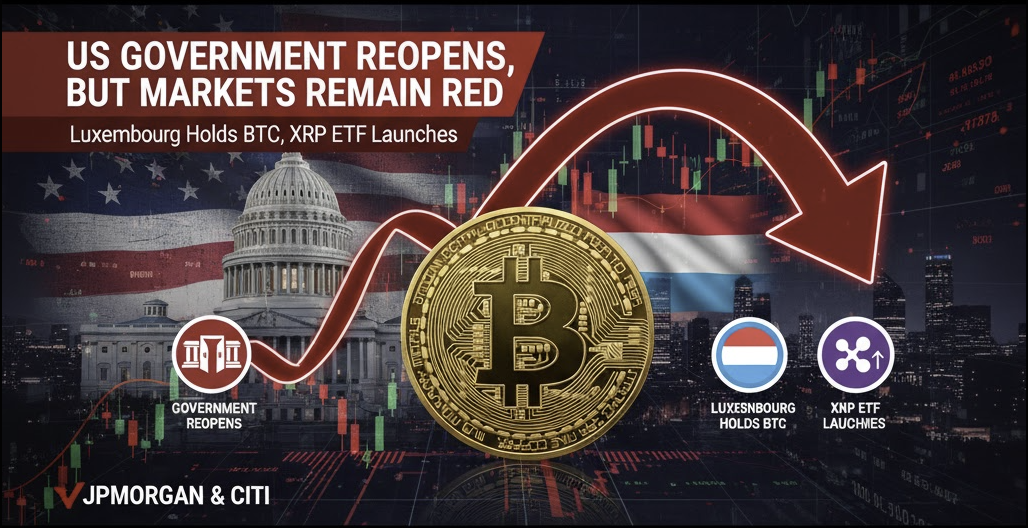Both the US stock market and crypto continue to decline amid bad news about US banks and ongoing trade tensions.
Market Overview
Stock Market Plunge & Banking Fears
US equities closed with declines across all three indices on Thursday (October 16th, US), with the Dow Jones dropping the most at 0.65%. Stock futures continued their decline. Oil traded sideways around $57.49 per barrel. Gold continued its ascent, reaching a new high of $4358 per ounce.
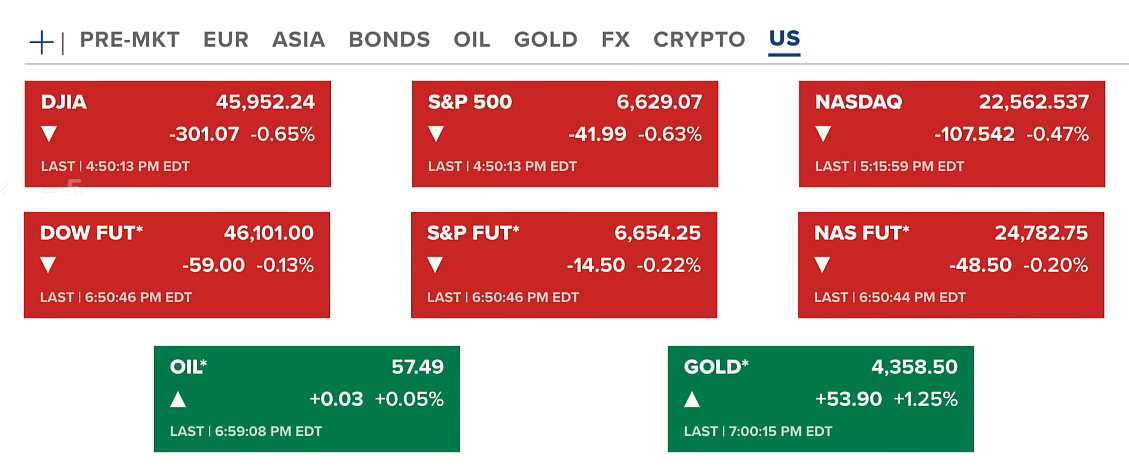
Fed Governors Stephen Miran and Christopher Waller spoke yesterday. Both supported monetary policy easing at the October 28–29 meeting but disagreed on the magnitude of the rate cut. Miran advocated for a 0.5% cut due to weak economic growth and escalating US-China tensions, but predicted the Fed would only cut 0.25% and implement three cuts in total this year. Conversely, Waller supported a 0.25% cut, arguing that cutting too quickly could cause inflation to return, especially with Trump's tariff policy creating temporary price pressure. Both Trump appointees agreed that the Fed should continue to ease but disagreed on the speed of action.
Crypto Dips but Holds Key Support
Bitcoin fell 2.9%, dropping below $110,000 and approaching the $107,000 "flash crash" zone. Altcoins uniformly declined, following BTC's trend. The overall crypto market capitalization corrected slightly to $3.68 trillion.
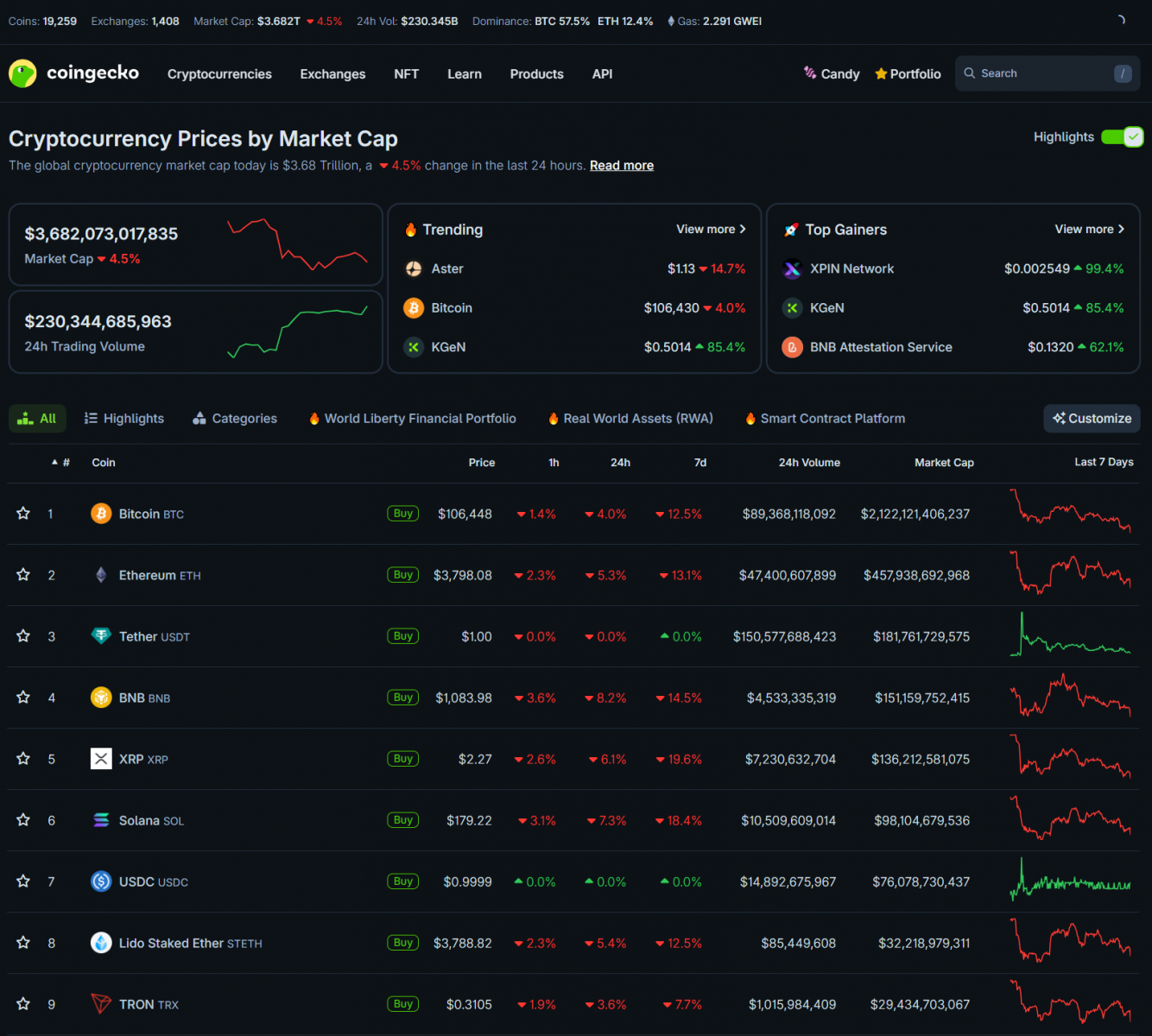
US BTC spot ETFs saw significant outflows on Thursday, exceeding $530 million. This trend was mirrored in ETH ETFs and SOL ETFs, with outflows of $56.8 million and $2.9 million, respectively.
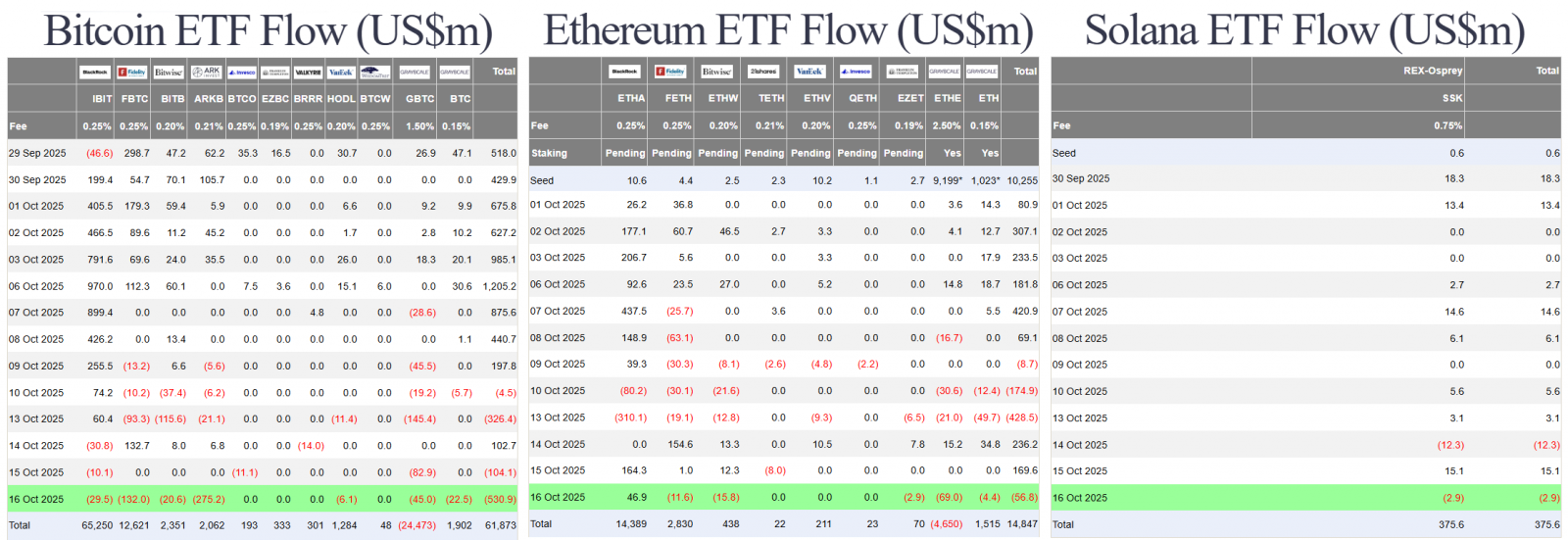
Despite the modest size of the decline, investor sentiment is currently more negative than during the FTX collapse due to liquidation events and exchange access errors that have eroded confidence. The market also saw a large volume of leveraged positions liquidated, primarily Longs. Investors are concerned because bad news causes sharp price drops, while good news fails to generate a positive response. Bitcoin and the entire crypto market continued to move in tandem with US stocks, which also turned red, indicating a strong influence from macroeconomic factors.
Bad News from US Regional Banks
Shares of regional US banks and Jefferies plunged as investors worried about bad loans linked to bankrupt companies in the auto industry. Zions Bancorporation dropped over 13%, Western Alliance fell 10%, and the regional bank ETF KRE lost 6%, with almost all stocks in the fund declining. The concern began when Zions reported losses from bad loans and Western Alliance disclosed fraud from a borrower. Fear spread after First Brands and Tricolor Holdings, two auto-related companies, filed for bankruptcy. Jefferies fell 10% due to its financial exposure to First Brands and has lost 25% this month, its worst drop since 2020. JPMorgan CEO likened the situation to "seeing one cockroach and assuming there are many more," suggesting potential hidden issues. The sell-off also spread to alternative asset management firms like Blue Owl (-7%), Ares (-6%), Blackstone (-3%), Apollo (-5%), and Carlyle (-4%). This situation is reminiscent of the 2023 crisis, when local banks collapsed due to Fed interest rate hikes, bond devaluation, and mass withdrawals. Although bank stocks are plummeting, the impact on crypto is not yet clear. The 2023 crisis ironically caused Bitcoin's price to rise as investors lost faith in the banking system.
Trade War Escalation & Global Crypto Adaption

China accused the US of creating panic about rare earth minerals, stating that the US is deliberately creating "unnecessary confusion" regarding Beijing's restrictions on rare earth exports and accusing the US of hypocrisy for banning semiconductor chip sales while criticizing China's control over the supply chain. Despite the tension, China stated it remains ready for trade negotiations with the US. Rare earth minerals are critical for both the military sector, such as F-35 fighter jets and missiles, and civilian technology, such as electric vehicles and chip manufacturing. The Trump administration has partnered with MP Materials, a US rare earth mining company, to secure domestic supply, and Treasury Secretary Scott Bessent said the US may acquire stakes in other companies to counter China's dominance in the rare earth sector. Bessent emphasized that stock market volatility will not change US trade policy, asserting that negotiation decisions will be based on long-term economic priorities, not short-term market reactions.
Positive Crypto Developments Despite Turmoil
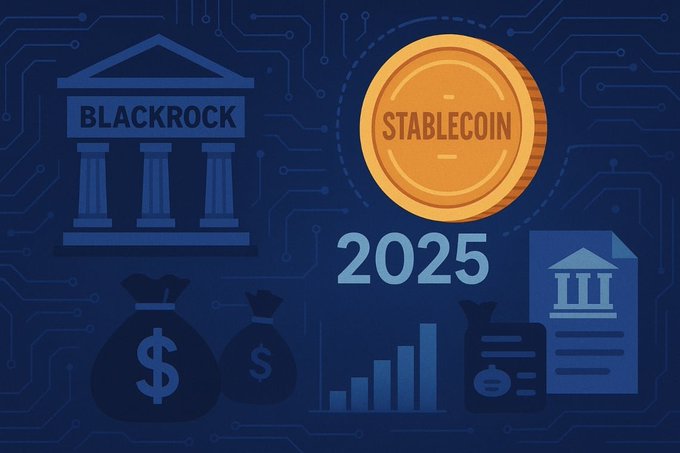
The market continues to show progress and participation from US financial institutions and banks in the crypto market. BlackRock has relaunched its Select Treasury Based Liquidity Fund (BSTBL) to meet the requirements of the GENIUS Act, preparing to act as a reserve asset manager for stablecoin issuers under the new federal regulations. The redesigned fund focuses on short-term US Treasury bonds and allows trading until 5 PM (US time), helping token issuers ensure liquidity and transparency under the GENIUS standard. In other words, BlackRock will help stablecoin companies legally and safely custody their reserve funds. Erebor Bank, backed by Peter Thiel and Palmer Luckey, just received preliminary approval from the Office of the Comptroller of the Currency (OCC), marking a significant step as the OCC becomes more open to the crypto-related banking sector. Erebor is preparing to finalize its management system, risk controls, and secure licenses from the Fed and FDIC to become an official national bank. Once complete, Erebor will serve tech, AI, defense, and digital asset companies, operating under a low-risk model. Additionally, U.S. Bank, the 5th largest bank in the US, has established a Digital Assets and Money Movement division, focusing on stablecoins, crypto custody, asset tokenization, and digital payments. Their goal is to develop a digital asset strategy, expand modern payment products, and accelerate the bank's digital transformation. These moves indicate that an increasing number of large US financial institutions are actively adapting and participating more deeply in the digital asset space. This participation helps them increase profits and retain younger customers, a demographic that tends to hold and favor crypto assets in the future.
Other Key Crypto & Market Updates
BitMine (Tom Lee's company) purchased an additional 104,336 ETH ($417 million), raising its total holdings to 3.03 million ETH (~$12.2 billion). The transactions were executed via Kraken and BitGo. The company aims to own 5% of the total Ethereum supply to solidify ETH's position in global capital markets. BlackRock relaunched the Select Treasury Based Liquidity Fund (BSTBL) to comply with the GENIUS Act, serving as a legal and secure reserve manager for stablecoin issuers using short-term US Treasury bonds. China Merchants Bank (CMB) tokenized a $3.8 billion money market fund on BNB Chain through its subsidiary CMB International in Hong Kong. The fund issues two tokens, CMBMINT and CMBIMINT, allowing investors to buy/sell using fiat or stablecoins and use them in DeFi applications. IMF Managing Director Kristalina Georgieva urged nations to accept the inevitable trend of digital currency, stating that both crypto and digital fiat are exploding in growth. She emphasized that governments should proactively learn and adapt rather than try to isolate themselves from this trend. Michael Saylor commented that Tom Lee is bringing significant credibility and influence to Ethereum, representing a $10 billion capital wave from Wall Street entering the crypto market. Saylor believes this signals crypto entering a maturity phase. The Trump family is estimated to have earned over $1 billion from crypto activities like NFTs, meme coins, World Liberty Financial, and the American Bitcoin project. This large profit has sparked controversy over conflicts of interest, especially after Trump signed the GENIUS Act legalizing stablecoins. Whale Alert detected that Paxos mistakenly minted 300 trillion PYUSD due to a technical error, but the company quickly burned the entire excess amount. The humorous incident, which briefly made PYUSD's supply double the global GDP, was a simple mistake involving "just six extra zeros."
Sources
- Bloomberg
- CoinDesk
- U.S. Treasury
- TradingView
- Reuters
- SEC
- White House Press Office
- Jerome Powell (Fed)
- Stephen Miran (Fed)
- JPMorgan Chase
- BlackRock Official Announcements
- Erebor Bank OCC Approval
- U.S. Bank Official Announcements
- BitMine Immersion Technologies Investor Relations
- China Merchants Bank (CMB)
- IMF Public Statements
Disclaimer
This article is for informational purposes only and should not be considered financial advice. Please do your own research before making investment decisions.

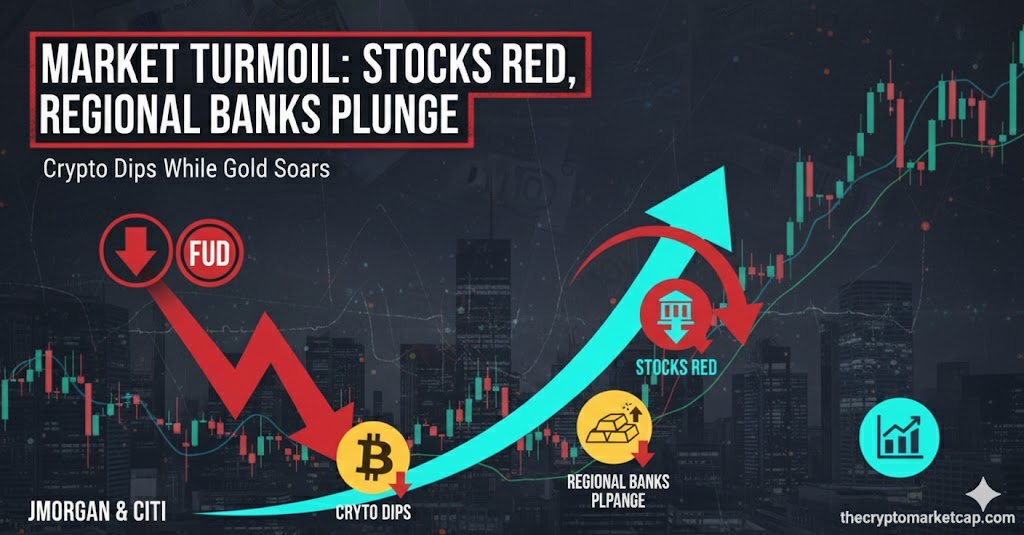
.png)




